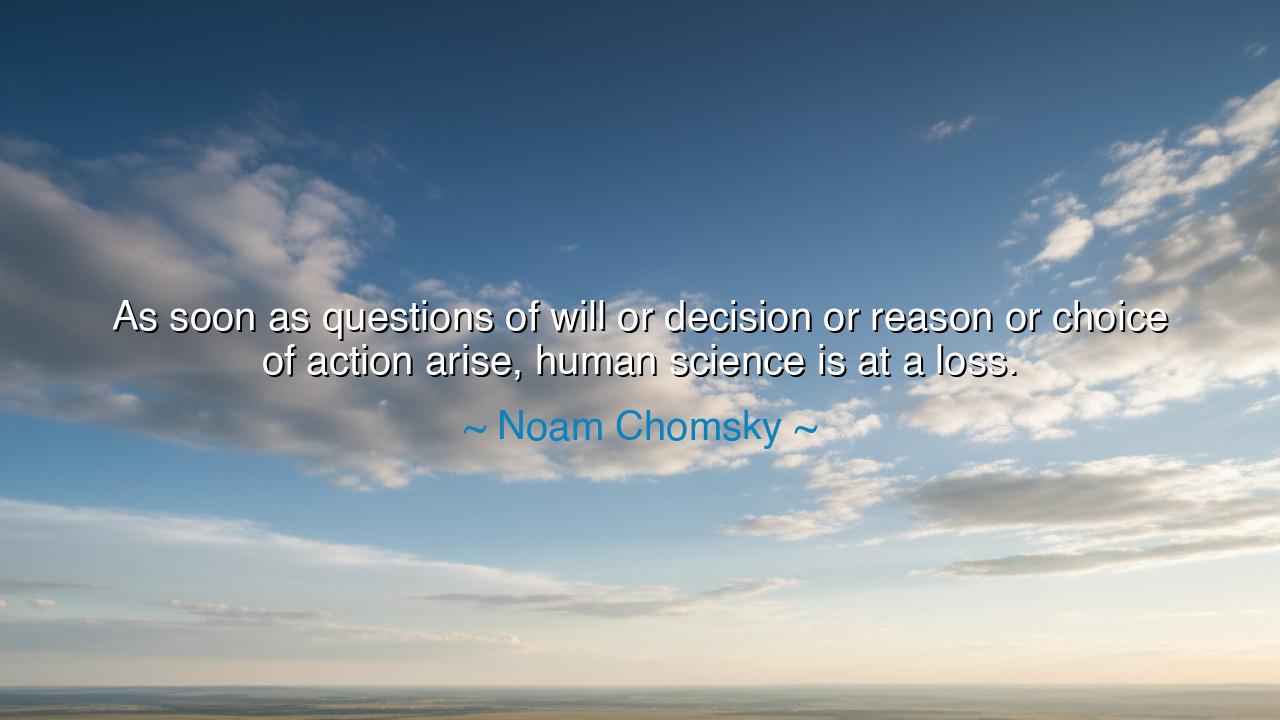
As soon as questions of will or decision or reason or choice of
As soon as questions of will or decision or reason or choice of action arise, human science is at a loss.






"As soon as questions of will or decision or reason or choice of action arise, human science is at a loss." These words of Noam Chomsky cut to the very heart of the mystery that lies at the core of the human experience. In them, Chomsky reveals a truth that has haunted philosophers and thinkers for millennia: the mysteries of human will, reason, and choice cannot be fully understood or explained by the rigid methods of science alone. Science, with its reliance on facts, data, and objectivity, is incapable of unraveling the complexity of the human soul, the inner workings of our desires, decisions, and moral judgments.
In the ancient days, the wise men of the world—Socrates, Plato, and Aristotle—sought to understand the nature of human decision-making. They pondered the questions of virtue, ethics, and the role of reason in guiding human action. For them, the path to wisdom was not to be found in the cold, calculating logic of the sciences, but in the deep introspection of the soul. They understood that choice was not simply a matter of following prescribed rules or laws, but of navigating the complex landscape of desires, values, and conscience. In this, they recognized that science could not offer all the answers to the deepest questions of the human heart.
Consider the story of Socrates, whose search for wisdom was rooted not in the accumulation of knowledge, but in the questioning of human values and actions. He did not seek to impose scientific explanations on the world; rather, he sought to understand the moral choices that each person must make. His belief in the importance of reason—the ability to think deeply about one’s actions and the consequences of those actions—was a cornerstone of his philosophy. Yet, despite his profound insights into the human condition, Socrates knew that the workings of the soul could never be fully explained by science. The questions of why we choose one path over another, or what drives us to act with courage or compassion, remain forever beyond the reach of empirical observation.
This truth, as Chomsky wisely points out, speaks to the limitations of human science. Science, as it is practiced today, has made great strides in understanding the physical world—the forces of nature, the structure of the atom, the vastness of space. But when it comes to understanding the very essence of what makes us human—our choices, our morals, our emotions—science falters. It cannot explain the impulse that drives one person to act selflessly while another acts with greed. It cannot predict why one soul will choose to love and another to hate. These are the mysteries that evade the grasp of science, for they lie in the realm of the spirit.
As we look to history, we find countless examples of individuals who have faced the great questions of will and action—people who have made choices that defy scientific explanation. Consider the story of Nelson Mandela, whose choice to dedicate his life to the cause of justice and freedom did not arise from any scientific formula, but from a deeply moral conviction. The force of his will, the strength of his beliefs, could not be reduced to the simple laws of physics or biology. His decision to face imprisonment for the sake of equality was not a calculation based on facts, but an act of will, driven by a profound understanding of right and wrong. Such choices, Chomsky reminds us, cannot be reduced to mere scientific analysis.
In this light, we must understand the lesson that Chomsky imparts: the human spirit is not a machine that can be understood purely through the lens of science. While science can help us understand the mechanics of the universe, it cannot explain the forces that shape the human soul. The questions of choice, decision, and moral action are the domain of philosophy, ethics, and human experience. We must approach these questions with humility, recognizing that there are aspects of our lives that cannot be fully understood or explained by data alone.
In our own lives, let us take this lesson to heart. While science can guide us in many areas—helping us to build, to heal, and to explore—we must remember that the greatest mysteries of life lie beyond its grasp. Choice, will, and reason are not simple equations that can be solved; they are the forces that define our humanity. As we make decisions, whether in the realm of personal relationships, social justice, or our own moral compass, we must recognize that these choices are not governed by scientific laws, but by the deeper currents of our values, conscience, and desires. And in this understanding, we find the wisdom to navigate the complexities of the human experience.






AAdministratorAdministrator
Welcome, honored guests. Please leave a comment, we will respond soon